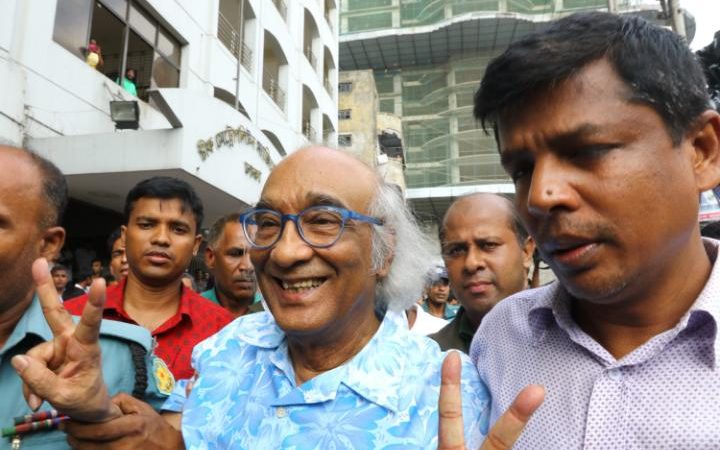by
Lawyers representing a leading British-Bangladeshi pro-opposition journalist arrested for involvement in an alleged plot to kill the prime minister’s son claim that US court documents show he is the victim of a politically motivated smear campaign.
Shafik Rehman, 81, one of the original founders of Spectrum radio in north London in the mid-1980s, was arrested on Saturday morning when three plain-clothes detectives entered his home in Dhaka pretending to be journalists.

A magistrate’s court ruled that the police could question Mr Rehman, a former BBC journalist, for five days to determine his role in the plot that police claimed was organised by leaders of the opposition Bangladesh Nationalist Party.
Mahmadur Rahman, the editor of another pro-opposition newspaper, who has been in prison since 2013 for various offences, was also officially listed as “shown arrested” in the same case.
However, US courts documents seen by The Telegraph appear to undermine the government claim that there was any plot in America to harm Sajeeb Wazed, the US-Bangladeshi son of Sheikh Hasina, the prime minister.
“This is a politically motivated allegation, as Shafik Rehman is now the convenor of the International Affairs Committee of the BNP,” Mohammad Asaduzzman, his lawyer, told The Telegraph.
“The criminal case against Shafik has been brought on the mere allegation of Sajeeb Wazed, that there was a plot to kill him, and the US court documents show that no plot was found.”
The US case concerned a US-Bangladeshi man, Rizve Ahmed, with strong associations with the opposition party in Bangladesh, paying an FBI agent to provide him confidential financial information about Mr Wazed. The two men, along with a mutual friend, pleaded guilty in March 2015 to bribery offences.
Mr Wazed, the purported target of a murder conspiracy, has said on Facebook postings that “the evidence against ‘journalist’ Shafik Rehman comes directly” from this case and that three men were “serving time in the US for this plot [against him]”.

These claims were repeated in the Bangladesh police case for which Mr Rehman has now been arrested. However, the US federal court transcripts show that the judge dismissed the prosecution claim that Ahmed sought the FBI information so that he could injure the prime minister’s son.
“The [US] government’s contention that [Rizve] Ahmed in fact sought to kidnap and physically harm an individual is a stretch,” Judge Vincent Briccetti concluded when he sentenced Ahmed to 44 months imprisonment for the bribery offences.
“This case is all about furthering Ahmed’s political aims, getting confidential information to expose what Ahmed apparently thought was corrupt behavior by the ruling party and otherwise embarrass [Sajeeb Wazed],” the judge stated, according to the transcripts.
On Tuesday, police claimed that they found some illegally obtained FBI information in the house of Mr Rehman who now edits the magazine Mouchake Dhil but was the long standing editor of the national newspaper Jai Jai Din.
“If the police found any documents, these would have been acquired in the course of Rehman’s professional work as a journalist, and this is perfectly legal,” said Mr Asaduzzaman, his lawyer.
The US government said that it had responded to Bangladesh’s request for assistance, but declined to give further details.
Mr Rehman was twice forced into exile by previous military governments, working for the BBC in London and gaining British citizenship.
In recent months, Mr Wazed has co-ordinated an orchestrated campaign against media outlets critical of his mother’s Awami League government, raising fears for press freedom in the country.
In February, he called for Mahfuz Anam, the outspoken editor of the country’s leading English language newspaper the Daily Star, to be prosecuted for treason for writing false information about Sheikh Hasina.
Government party activists have since filed 17 cases of sedition and 62 cases of criminal defamation against the editor in different parts of the country.
Mr Anam’s daughter, Tahmima, the London-based award-winning author and Man Booker prize judge, told The Telegraph that the attacks on her father were part of a “rising environment of intolerance to critical and dissenting views”.
As well as the lawsuits seeking damages of £11.8 billion, his newspaper has been subject to a advertising blockade organised by government authorities.
Source: telegraph.co.uk










